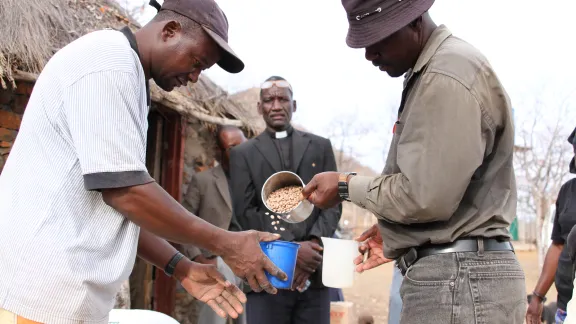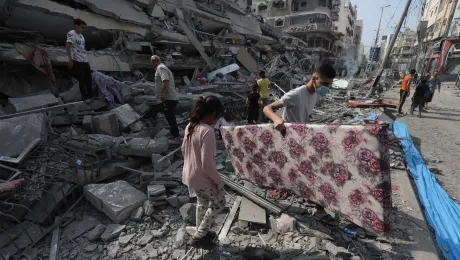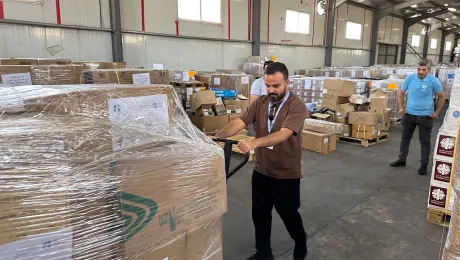
Rev. Salomão Tchoya oversees the food distribution in Oxavikwa village, southern Angola. Photo: FELM/Laura Meriläinen-Amaumo
LWF and ACT Forum Partners Continue Food Distribution to Drought Affected Communities
LUANDA, Angola/GENEVA, 7 February 2014 (LWI) – A woman and her children dig a hole in the dry riverbed, hoping to find at least a drop of water. The merciless sun has not yet made way for rain clouds here. This has been the worst drought in Angola in more than 30 years, locals say.
In Oxavikwa village, the residents gather on a hot Sunday morning to receive their rations of maize meal, beans and cooking oil. Kaveliunwa Katjipaleke, who is pregnant, came to collect her share with her mother Emilia Katiti.
"We are so thankful for this help. I am pregnant and staying hungry is not good for the baby,” Katjipaleke explains.
"Sometimes I can't take the hunger anymore and I go to the neighbors to ask for food even though they don't have anything either,” Katiti says, adding that many families eat only one meal per day or nothing at all.
Even though the rains have started in parts of Angola, the situation is still critical in some regions after nearly three years of drought. In the southern provinces of Cunene and Huila, over 629,000 people, representing nearly 57 percent of the population, still require emergency assistance.
In a drought response initiated for Angola in August 2013, The Lutheran World Federation (LWF) and its local ACT Alliance partners including the LWF Department for World Service (DWS) program in Angola and the Evangelical Lutheran Church of Angola continue to distribute food to the most affected vulnerable groups in critical regions. The distribution is planned to last until April 2014 when the first harvest is expected.
Running Away from Hunger
In Oxavikwa, a remote village in Cunene province, the prolonged absence of rains has led to cases of malnutrition and outbreak of diseases. Livestock is dying, and the few animals left are merely skin and bones.
Due to the desperate situation, many people are making plans to leave their homes and move to places where they can find pastures for their animals, and to cities in search of means of survival.
"The day we will finish selling the goats, we will move. Then we will have nothing left. But I really hope the rains will continue and we don't have to move,” says Jeremias Munekamba, a father of seven.
It is difficult to encourage people to stay, according to Rev. Salomão Tchoya, the local IELA pastor. Without rains, he adds, people can't grow the staple food, mahangu (millet) and take care of their animals.
"They are running away from hunger. They have nothing left," he sighs.
Increase in Cholera Cases
According to a January report by the ACT Forum in Angola, the current drought and food crisis has led to an outbreak of cholera, with significantly more numbers reported compared to the previous year. In 2013, over 3,840 cholera cases and 133 deaths were recorded in Cunene province, while Huila had over 1,440 cases and 46 deaths. Although the fatalities in Cunene were fewer compared to the 221 reported in 2012, partly due to quick intervention by the government, awareness about good hygiene and sanitation is still needed in order to prevent outbreaks.
There are fears that the cholera outbreak may spread if the rains increase. The remote villages do not have pit latrine systems in place, and people relieve themselves in holes dug in the bush. With heavy rains, there is a high risk that the exposed human waste will increase the spread of diseases.
"The cholera outbreak is a result of poor hygiene and lack of toilets. It is also a problem that people drink from [artificial] dams. The same water is used for cooking, washing clothes, bathing and as cattle's drinking water. We are now going to raise health awareness by educating people, that's the second phase of the emergency response," says Abrao Mushivi, emergency coordinator for the LWF/DWS program in Angola.
A few hundred meters away from a food distribution point, a woman lies under a tree with her baby. She has been diagnosed with cholera and barely has energy to lift up her head.
"Usually cholera takes 24 hours to make you weak, but because she [the woman] was already so weak from hunger, she deteriorated in a matter of few hours, just like that," Cipriano Kaluhongue an assistant nurse, explains.
"But luckily she is getting better now."
Too Weak to Attend School
As the sun starts to set, a small number of people are still waiting for their share of maize meal and beans. Some voice concern that the food will run out before their turn. But Tchoya assures everyone that they will receive food; he is well aware that the maize meal is needed urgently so that they can go home and cook.
"We have never experienced anything like this before. There was a severe drought back in 1981, but it was not this bad," he says.
The food crisis has also led to social problems, which IELA Bishop Tomás Ndawanapo sees as a great concern. According to many parents, children do not have enough to eat, and are therefore not attending school because they don't have the energy to walk the long distances and stay alert in class.
"The country will not grow if [children] are not attending school. We need well educated youth. It is important that we as a community and as a church work together in this situation,” he adds.
While some parts of Angola are currently experiencing more rains than in recent years it is not yet enough. In Oxavikwa village, they are convinced that going back to normal is still “many rain clouds away."
(A contribution by Laura Meriläinen-Amaumo, Communication Officer at the Finnish Evangelical Lutheran Mission (FELM), during a recent visit to Angola.)


